By the time the 2027 Rugby World Cup kicks off in Australia, it'll have been 24 years since the Webb Ellis Cup has resided anywhere outside of New Zealand or South Africa.
With the game’s big two contesting the 2023 final tonight, it’ll be the fifth tournament in a row that’s been won by either the All Blacks or Springboks, and for whichever side does, it’ll be a record fourth World Cup win.
That record suggests the Rugby World Cup has become a closed shop for potential winners, something that the evidence of this tournament strongly contradicts.
Were South Africa to win, it would be hard to argue against this being the greatest World Cup title we’ve ever seen; their pool with Ireland and Scotland saw three of the top five sides in the world fighting it out for two-quarter-final spots, before the Springboks saw off hosts France and 2019 finalists England to book their place in the final against the three-time champions New Zealand.
If anyone is to stop their run to a second World Cup title in a row, it could be themselves.
There has always been the air of the mad scientists about both Erasmus and head coach Jacques Nienaber, who look at the game differently to their contemporaries.
While most countries named 33-man squads with a broadly similar positional profile, South Africa ripped up that playbook. The going rate in most World Cup squads was three hookers, but South Africa chose two. When one of those – Malcolm Marx – went down injured in the opener against Scotland, they chose to call up an out-half in his place.
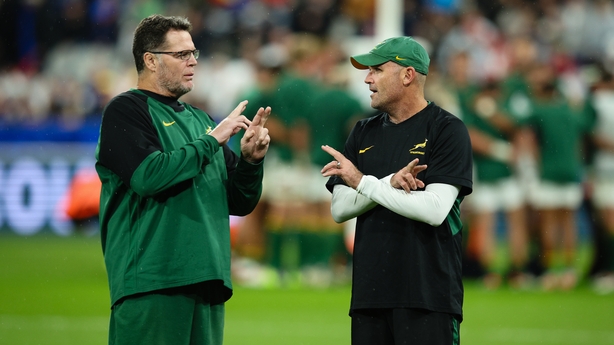
Where others brought three scrum-halves in their extended squad, South Africa brought four, only one of whom is even named in their matchday squad for the final.
The wildest of their experiments has been the 7:1 split of forwards to backs on their bench, a selection that drew steam from the ears of some rugby pundits when they debuted it in their final warm-up game in which they stuffed New Zealand 35-7, a record defeat for the All Blacks.
There are obvious benefits to the 7:1 split. When it works, it allows the Boks maximum power in their pack across the 80 minutes, and power is the currency of Springbok rugby.
It’s important to stress the three words "when it works" though, because there’s minimal evidence of it being a winning formula. While they thrashed the All Blacks when they debuted the strategy in August, its effectiveness was overstated considering they were 21-0 ahead before they even looked to their bench. They went back to the 7:1 split in their Pool B meeting with Ireland, and while it wasn’t necessarily a failure, the fact that they were beaten would suggest it also wasn’t a success.
Whether it’s a success or a failure, it’s a fascinating risk. On this week’s RTÉ Rugby World Cup podcast, Bernard Jackman described it as "probably the biggest risk I’ve seen any coach take going into a World Cup final". It’s hard to argue against it.
With Willie le Roux acting as the sole specialist backline replacement, it leaves them badly exposed in the event of an early injury. In theory, all of the bases are covered; Cheslin Kolbe can cover scrum-half if Faf de Klerk suffers a knock, Kolbe and Damian Willemse are capable of filling in at out-half, while flanker Kwagga Smith should be able to fill in at centre or the wing in the event of an emergency.
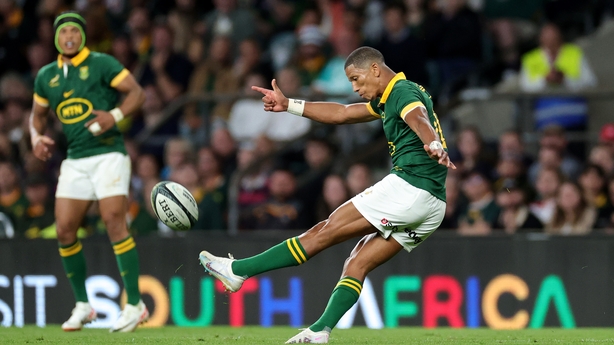
The Springboks bench has dominated conversation in recent days, but their starting side gives a real indication as to what their mindset will be in the final. De Klerk and Handre Pollard both come into the side, replacing Cobus Reinach and Manie Libbok, both of whom drop out of the matchday squad.
The selection of De Klerk and Pollard – South Africa’s most experienced half-back combination – indicates that the defending champions will be looking play for territory and allow their bruising pack get to work at scrum and lineout.
In response, New Zealand have made some selections with the set-piece in mind. The only change in the starting XV from their semi-final sees Brodie Retallick come in for Sam Whitelock, but the inclusion of hooker Samisoni Taukei’aho and tighthead prop Nepo Laulala on the bench is notable.
Taukei’aho’s inclusion comes at the expense of veteran Dane Coles, who is to retire after the tournament, while Laulala gets the nod ahead of Fletcher Newell, with both of this week’s subs generally regarded as more powerful scrummagers which will be needed in the final quarter against the likes of Ox Nche and Trevor Nyakane
When South Africa hammered the All Blacks in August, the foundation was laid by a dominant set-piece. In the opening 15 minutes alone, New Zealand gave up four penalties at the lineout and maul with a further two at the scrum, which contributed to a pair of yellow cards.
Of the 14 total penalties they gave away on the night, nine came via the scrum, lineout or maul.
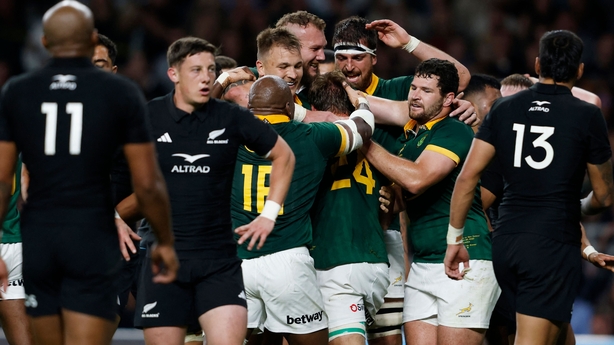
Of course, too much can be read into one game, and in recent weeks their forward specialists Jason Ryan and Greg Feek have toughened up the All Blacks pack, whose lineout success of 97% is statistically the best in the competition, with their scrum success of 94% a respectable fourth overall.
If it comes down to a set-piece battle New Zealand may struggle, but if their back row trio of Shannon Frizell, Sam Cane and World Rugby player of the year nominee Ardie Savea keep up their recent form, it could be the All Black trump card. In seven previous games in which they’ve started together, the consortium have only been beaten once.
While it’s hard to forget the 35-7 loss to the Springboks, equally it's worth remembering New Zealand’s 35-20 win against South Africa in July, in which Ian Foster’s side played a blistering brand of rugby with tries for Aaron Smith and Frizell seeing them run into to a 17-0 lead.
On the night, their ability to play at pace bamboozled South Africa, while the kicking ability of Richie Mo’unga and Beauden Barrett saw them exploit space both out wide and in behind the Springboks’ rush defence.
The amount of times they can get the ball into Will Jordan’s hands will have a big impact on New Zealand’s chances. The wing was one of the beneficiaries of Barrett’s crosssfield kicking that night in July, scoring one of what is now a phenomenal 31 tries in just 30 Test matches.
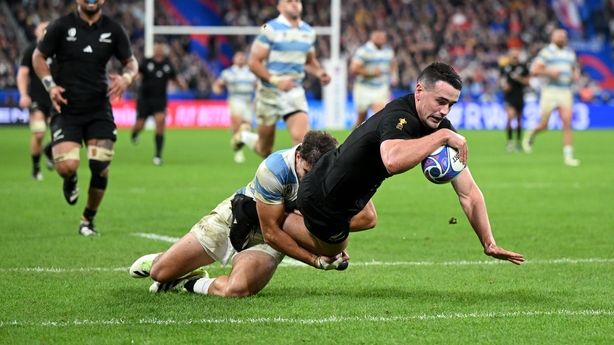
The 25-year-old has scored eight alone in this World Cup to draw level with Julian Savea (2015) and Jonah Lomu (1999) for tries in a single tournament.
One try for Jordan in the final will be enough for him to set a new record on his own, but that’s easier said than done. In their three previous final appearances, the Springboks’ line hasn’t been breached once.
Considering their dominance of the game in the professional era, it seems remarkable that this is just the second time they’ll have met in a final, with the Springboks winning after extra-time on home soil back in 1995. They would go on to win again four years later when the sides met in the third-place playoff.
In three subsequent meetings, New Zealand have come out on top, the most recent coming in 2019 when they defeated the Boks in their opening pool game, before Rassie Erasmus’s side would recover to claim the ultimate prize. South Africa head coach Jacques Nienaber has already said he believes 30 points is the mark you need to beat the All Blacks, and if that proves to be the case tonight, the neutral is in for a treat.
While a New Zealand win wouldn’t necessarily be among the great sporting upsets given their standing in the game, it would be a remarkable way for head coach Ian Foster to bow out.
For much of his time in charge since replacing Stave Hansen in 2020, 'Fozzie’ has been an unpopular appointment, and following their Test series defeat to Ireland in 2022 it reportedly took an intervention from a group of senior players to prevent him from being sacked there and then.
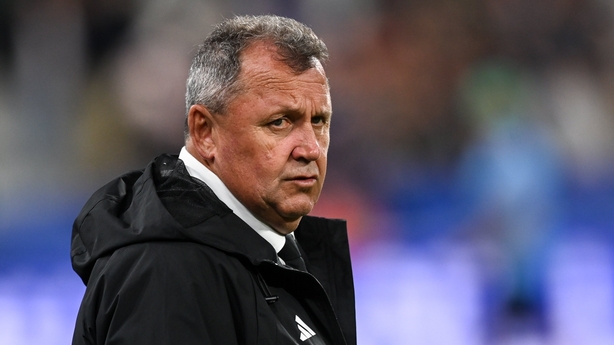
Changes have been made around Foster (above), with Joe Schmidt’s temporary role extended up to the World Cup, while Jason Ryan has put manners on the forwards.
Win or lose, this will be his last stand though, with Scott Robertson having been confirmed as his successor back in March of this year. Far from being a lame duck, Foster’s tenure has reached full flight in recent weeks and may well have the perfect ending.
Verdict: New Zealand
New Zealand: Beauden Barrett; Will Jordan, Rieko Ioane, Jordie Barrett, Mark Tele'a; Richie Mo'unga, Aaron Smith; Ethan de Groot, Codie Taylor, Tyrel Lomax; Brodie Retallick, Scott Barrett; Shannon Frizell, Sam Cane (capt), Ardie Savea.
Replacements: Samisoni Taukei'aho, Tamaiti Williams, Nepo Laulala, Samuel Whitelock, Dalton Papali’i, Finlay Christie, Damian McKenzie, Anton Lienert-Brown.
South Africa: Damian Willemse; Kurt-Lee Arendse, Jesse Kriel, Damian de Allende, Cheslin Kolbe; Handre Pollard, Faf de Klerk; Steven Kitshoff, Bongi Mbonambi, Frans Malherbe; Eben Etzebeth, Franco Mostert; Siya Kolisi (capt), Pieter-Steph du Toit, Duane Vermeulen.
Replacements: Deon Fourie, Ox Nche, Trevor Nyakane, Jean Kleyn, RG Snyman, Kwagga Smith, Jasper Wiese, Willie Le Roux.
Listen to the RTÉ Rugby podcast on Apple Podcasts, Spotify or wherever you get your podcasts.
Watch New Zealand v South Africa in the Rugby World Cup final on Saturday from 7pm on RTÉ2 and RTÉ Player, follow a live blog on RTE.ie/Sport or the RTÉ News app








